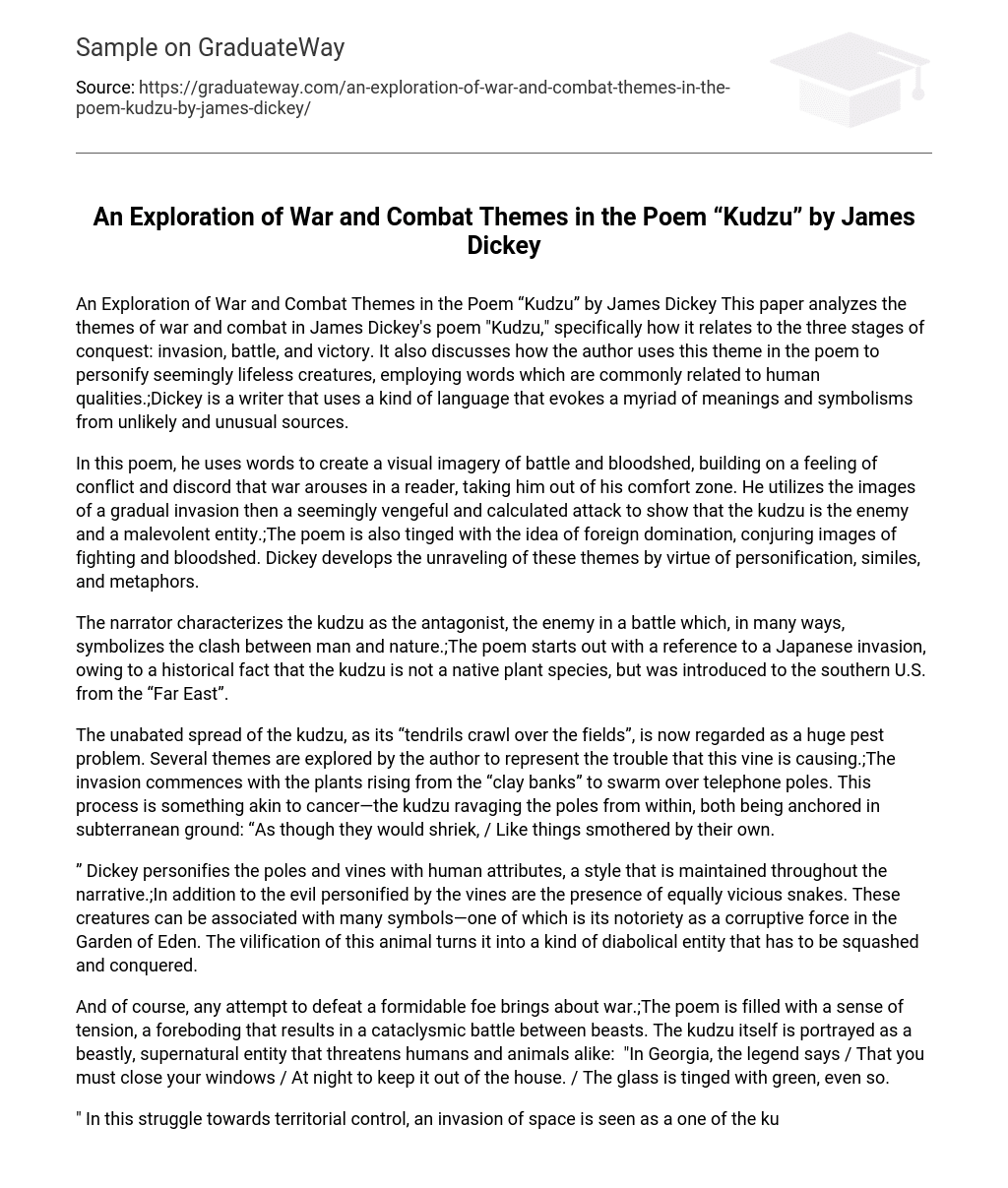An Exploration of War and Combat Themes in the Poem “Kudzu” by James Dickey This paper analyzes the themes of war and combat in James Dickey’s poem “Kudzu,” specifically how it relates to the three stages of conquest: invasion, battle, and victory. It also discusses how the author uses this theme in the poem to personify seemingly lifeless creatures, employing words which are commonly related to human qualities.;Dickey is a writer that uses a kind of language that evokes a myriad of meanings and symbolisms from unlikely and unusual sources.
In this poem, he uses words to create a visual imagery of battle and bloodshed, building on a feeling of conflict and discord that war arouses in a reader, taking him out of his comfort zone. He utilizes the images of a gradual invasion then a seemingly vengeful and calculated attack to show that the kudzu is the enemy and a malevolent entity.;The poem is also tinged with the idea of foreign domination, conjuring images of fighting and bloodshed. Dickey develops the unraveling of these themes by virtue of personification, similes, and metaphors.
The narrator characterizes the kudzu as the antagonist, the enemy in a battle which, in many ways, symbolizes the clash between man and nature.;The poem starts out with a reference to a Japanese invasion, owing to a historical fact that the kudzu is not a native plant species, but was introduced to the southern U.S. from the “Far East”.
The unabated spread of the kudzu, as its “tendrils crawl over the fields”, is now regarded as a huge pest problem. Several themes are explored by the author to represent the trouble that this vine is causing.;The invasion commences with the plants rising from the “clay banks” to swarm over telephone poles. This process is something akin to cancer—the kudzu ravaging the poles from within, both being anchored in subterranean ground: “As though they would shriek, / Like things smothered by their own.
” Dickey personifies the poles and vines with human attributes, a style that is maintained throughout the narrative.;In addition to the evil personified by the vines are the presence of equally vicious snakes. These creatures can be associated with many symbols—one of which is its notoriety as a corruptive force in the Garden of Eden. The vilification of this animal turns it into a kind of diabolical entity that has to be squashed and conquered.
And of course, any attempt to defeat a formidable foe brings about war.;The poem is filled with a sense of tension, a foreboding that results in a cataclysmic battle between beasts. The kudzu itself is portrayed as a beastly, supernatural entity that threatens humans and animals alike: “In Georgia, the legend says / That you must close your windows / At night to keep it out of the house. / The glass is tinged with green, even so.
” In this struggle towards territorial control, an invasion of space is seen as a one of the kudzu’s dangers that the farmers would have to inevitably retaliate against. In our minds, the plants takes on an anthropomorphic form, a vicious and angry fiend that poses a grave catastrophe. The author then goes on to detail how the livestock are killed by the snakes hiding beneath the kudzu’s canopy, leaving a trail of fear in their wake. The poem also illustrates the theme of “war” in the farmer’s revenge.
When one of their own cattle are struck down, they exact retribution. The kudzu’s deceptive character also underlies the fact that the snakes use the plant to conceal themselves, another allegory to camouflage/disguise strategies that are known to be used in combat. This disguise serves as a primal force that gives “Great powers into their bodies/ And the freedom to strike without warning.” The vines serve as a form of defense, keeping in line with the war symbolism.
;Again, the concept of territoriality is alluded to. Where a person treads into a place where “It should not, it never should be,” that person takes on a risk and “waits to be struck”. The war is caused, in part, by a struggle as to who controls and lords over a given territory. As the vines spread and invade the southern fields, cattle and humans can be seen as trespassers to these territories and should therefore be dealt with.
These underscores the use of space in battles, and how control over a domain can spark conflicts with far-reaching ramifications.;The onset of battles starts, and the militaristic theme is obvious in the lines, ”Tapping your window like lightning,/ You remember what tactics to use”. The narrator recognizes the potential threat to his property, including hogs and cattle. The use of the word “tactics” deserve to be noted, as it is commonly used in the military as a science that deals with strategies in war.
And as all battles go, the scene where the hogs strike the enemies, is chaotic and horrifying: “The sound is intense, subhuman, /Nearly human with purposive rage.”;Finally comes the victory—the humans making use of ferocious hogs as allies, have managed to expose the snakes from their safe haven, showing that their advantage is only good as long as the kudzu, the ones that gave them their “earthly power” is unconquered.;





